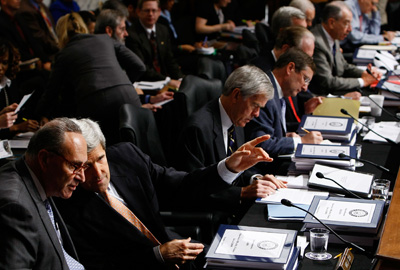
The so-called “public option” component of health care reform died today when the Senate Finance Committee’s Health Care Subdivision (essentially the entire committee) rejected an attempt to include it in legislation the panel is considering. Other bills circulating at the Capitol still have “public option,” but Sen. Max Baucus removed it from his bill under pressure from Republicans, who considered it Socialist. The number of Democrats refusing to support the idea pretty much sinks it.
The vote was 15-to-8, with Democrats Baucus, Sen. Tom Carper, Sen. Kent Conrad, Sen. Blanche Lincoln, and Sen. Bill Nelson joining all of the committee’s Republicans with “no” votes.
Most of the Democrats voting against the bill, were among the biggest Democratic recipients of health care cash in campaign fundraising. Coincidence? Who can say? The campaign finance system is such that one can only speculate what role it plays when legislation is considered that affects the campaign contributors. So you have to decide.
Here’s the breakdown by committee members. The numbers in parentheses represents its rank for that senator in the grouping of contributions by industry. Keep in mind, these numbers are the amount raised through the end of June, well before the health care issue dominated the national dialogue.
DEMOCRATS
John D. Rockefeller, West Virginia (Chairman) – $255,950 from health professionals (2nd),
Jeff Bingaman, New Mexico – $210,563 from health professionals (3rd) and $92,000 from pharmaceutical industry (7th).
Sen. Kent Conrad, North Dakota – $239,533 from health professionals (3rd), $233,625 from the insurance industry (4th).
John Kerry, Massachusetts – $91,036 from insurance industry (7th). $64,948 from health professionals (13th)
Blanche Lincoln, Arkansas – $298,700 from health professionals (2nd), $153,304 from pharmaceutical industry (5th) and $131,850 from insurance industry (8th).
Ron Wyden, Oregon – $173,475 from health professionals (1st), $83,299 from insurance industry (7th).
Charles Schumer, New York – $155,300 from insurance industry (5th) , $108,650 from health professionals (9th).
Debbie Stabenow, Michigan – $338,455 from health professionals (4th). Second-biggest contributor was Blue Cross Blue Shield ($59,700)
Maria Cantwell, Washington – $206,001 from health professionals (11th).
Bill Nelson, Florida – $332,179 from health professionals (6th)
Robert Menendez, New Jersey – $256,950 from health professionals (7th)
Thomas Carper, Delaware – $238,680 from insurance industry (2nd), $139,520 from pharmaceutical industry (7th).
REPUBLICANS
Sen. Charles Grassley, Iowa – $241,856 from health professionals (1st), $201,148 from insurance industry (2nd), $152,650 from pharmaceutical industry (3rd), $139,137 from hospitals and nursing homes (4th). Blue Cross Blue Shield ($26,750) is second-largest contributor. Select Medical Group is third-largest contributor ($23,000).
Orrin G. Hatch, Utah. Ranking member – $481,081 from insurance industry (1st), $242,550 from health professionals. Blue Cross Blue Shield is second-largest contributor ($45,603)
Olympia Snowe, Maine – $174,074 from health professionals (2nd), $163,585 from insurance industry (3rd). Aetna Inc., is second-biggest contributor.
John Ensign, Nevada – $269,325 from health professionals (3rd), $211,462 from insurance industry (7th).
Michael Enzi, Wyoming – $218,700 from pharmaceutical industry (1st), $144,049 from health professionals (2nd), $124,250 from insurance industry (4th). Blue Cross Blue Shield is fifth-largest contributor ($15,000).
John Cornyn, Texas – $759,113 from health professionals (4th), $350,294 from insurance industry (9th).
John Kyl, Arizona – $649,383 from health professionals (4th).
Jim Bunning, Kentucky – $86,433 from insurance industry (1st), $63,650 from health care (3rd). Kindred Healthcare is fourth-largest contributor ( $12,100).
Pat Roberts, Kansas – $178,299 from pharmaceutical industry (9th).
(Source: OpenSecrets.org)
